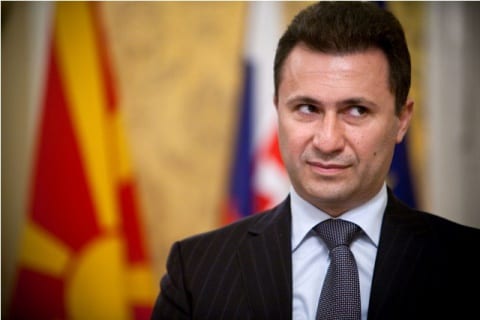Macedonia’s Special Prosecution, SJO, said it suspects former Prime Minister and VMRO DPMNE leader Nikola Gruevski illegally financed his party through money laundering and was also involved in misuse of his office in relation to a highways contract.
By Sinisa Jakov Marusic, Balkan Insight
TThe SJO on Monday launched three new investigations, two of which name the leader of the VMRO DPMNE party, Nikola Gruevski, as the main suspect. The investigations are codenamed “Talir”[old silver coin], “Traektorija” [trajectory], and “Trevnik” [lawn].
As a result, the SJO on Monday in Skopje said it will demand a freeze of the vast assets owned by the former ruling party, including its new lush headquarters in central Skopje, which the SJO suspects was illegally financed and obtained.
“Talir” case:
In the first and most complex case, codenamed “Talir”, the SJO suspects 11 people from the VMRO DPMNE party of money laundering and of misuse of office.
Nine people, including Gruevski, are being investigated as perpetrators and an additional two as helpers. Apart from the party leader, the SJO said suspects include the party’s secretary generals, persons in charge of signing the party’s account as well as the head of the party’s communications centre.
The SJO said it considers Gruevski the main suspect, alleging that in his capacity as VMRO DPMNE head, he accepted 4.9 million euros of illegal donations for his party between 2009 and 2015, when he was Prime Minister.
The investigation has shown that instead of returning the money to the national budget, as should have been done when it comes to illegal donations, he used the money to illegally finance his party.
The SJO said it suspected that the money was transferred to 11 people and then used to buy real estate, pay for party expenditures, hotel accommodation, popular surveys and other things.
The money was also used in 78 contracts to buy real estate, the SJO revealed, adding that a number of these properties were not used for party purposes. The SJO said it had filed 12 requests to the courts to freeze these assets.
“We are talking about 12 requests,[for freezing of assets] each containing at least three properties,” deputy Special Prosecutor Lence Ristoska said.
The SJO suspects the illegal money was injected into the party’s account using various forms of money-laundering. Some of the suspects allegedly made payments to the party account, falsley portraying the money as personal donations or as membership fees.
The SJO said it had evidence that some of the payment slips were written in the same handwriting and registered as paid into the banks over intervals of between 20 and 30 seconds.
According to SJO’s estimates, calculated for each separate year, at certain periods the former ruling party was netting 12,000 to 30,000 euros a day this way.
The SJO said it had questioned over 160 witnesses for this case, sent 230 requests to various institutions and analyzed 11,886 payment slips directed from private persons to the party.
“Traektorija” case:
In the second investigation, the SJO suspects four persons of misusing office during the second half of 2012 and 2013.
The SJO said it had reason to believe that the suspects broke the Public Procurement Law and directly awarded a 155-million-euro contract to construct two highway stretches to a preferred Chinese construction company.
This was despite the fact that another Chinese company submitted a lower bid for the highway work. Gruevski, who was then Prime Minister, is again the main suspect in this investigation.
“Trevnik” case:
The third investigation refers to the suspected illegal construction of three weekend houses in the village of Zelenikovo, near Skopje. The preliminary investigation showed that while the construction of these houses began in 2011, the trio of suspects acquired the building permits for them two years later, once the objects were completed.
The VMRO DPMNE party has issued a defiant reaction to news of these investigations.
Secretary general Emil Dimitriev dismissed the investigations as “political pamphlets” aimed at falsely claiming that the party and its leaders had engaged in “some kind of illegal activities.”
Dimitriev, who is still interim Prime Minister, told a press conference that such claims “are completely false” and that “the party’s entire property has been legally obtained”.
The SJO was formed in 2015 as a reult of an EU-brokered crisis agreement between the main political parties and tasked with investigating allegations of high-level corruption.
Although VMRO DPMNE agreed to form the SJO, the party has since accused it of working for their opponents in the Social Democratic Party – the party currently engaged in talks on forming the new government.









